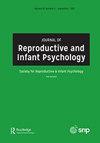Midwives' perspectives and perceptions in relation to perinatal psychotic-like experiences: a qualitative study.
IF 1.6
4区 心理学
Q2 PSYCHOLOGY, MULTIDISCIPLINARY
Journal of Reproductive and Infant Psychology
Pub Date : 2024-09-18
DOI:10.1080/02646838.2024.2405122
引用次数: 0
Abstract
BACKGROUND Psychotic-like experiences (PLEs) refer to subclinical experiences consistent with psychosis that may include hearing, feeling or seeing things that others cannot, or experiencing unusual beliefs. These experiences appear to be more common during the perinatal period. There appear to be barriers which make it difficult for midwives to support mothers with mental health difficulties. However, it is important that midwives can provide support with PLEs. AIM This study aimed to explore UK midwives' perspectives and perceptions relating to mothers' psychotic-like experiences in the perinatal period. METHODS A qualitative study using semi-structured interviews with ten midwives recruited online was conducted. Transcripts were analysed using thematic analysis. RESULTS Four themes were developed: (1) Identifying psychotic-like experiences would be complicated; (2) Psychotic-like experiences can feel overwhelming for women and midwives; (3) This is my responsibility: I'll do what I can to support women even if it's hard; and (4) The system feels unsafe and insecure which makes the anticipated role in supporting psychotic-like experiences harder. CONCLUSION Midwives described their motivation to support mothers with PLEs but articulated many factors that made this difficult. The results emphasise the importance of training and guidance for midwives to support them being able to offer support and information to mothers. The findings also highlight the importance of systemic safety for midwives alongside support through supervision and reflective practice.助产士对围产期精神病样经历的观点和看法:一项定性研究。
背景精神病样经历(PLEs)是指与精神病一致的亚临床经历,可能包括听到、感觉到或看到别人看不到的东西,或经历不寻常的信念。这些经历似乎在围产期更为常见。助产士在为有心理健康问题的母亲提供支持时似乎会遇到一些障碍。本研究旨在探讨英国助产士对围产期母亲精神病样经历的观点和看法。方法本研究采用半结构式访谈的方式对网上招募的 10 名助产士进行了定性研究。结果形成了四个主题:(1)识别类似精神病的经历会很复杂;(2)类似精神病的经历会让产妇和助产士感到不知所措;(3)这是我的责任:结论助产士描述了她们为有 PLE 的母亲提供支持的动机,但也阐明了许多导致支持困难的因素。研究结果强调了对助产士进行培训和指导的重要性,以帮助她们为母亲提供支持和信息。研究结果还强调了助产士系统安全的重要性,以及通过督导和反思实践提供支持的重要性。
本文章由计算机程序翻译,如有差异,请以英文原文为准。
求助全文
约1分钟内获得全文
求助全文
来源期刊

Journal of Reproductive and Infant Psychology
PSYCHOLOGY, MULTIDISCIPLINARY-
CiteScore
6.80
自引率
8.00%
发文量
55
期刊介绍:
The Journal of Reproductive and Infant Psychology reports and reviews outstanding research on psychological, behavioural, medical and social aspects of human reproduction, pregnancy and infancy. Medical topics focus on obstetrics and gynaecology, paediatrics and psychiatry. The growing work in relevant aspects of medical communication and medical sociology are also covered. Relevant psychological work includes developmental psychology, clinical psychology, social psychology, behavioural medicine, psychology of women and health psychology. Research into psychological aspects of midwifery, health visiting and nursing is central to the interests of the Journal. The Journal is of special value to those concerned with interdisciplinary issues. As a result, the Journal is of particular interest to those concerned with fundamental processes in behaviour and to issues of health promotion and service organization.
 求助内容:
求助内容: 应助结果提醒方式:
应助结果提醒方式:


